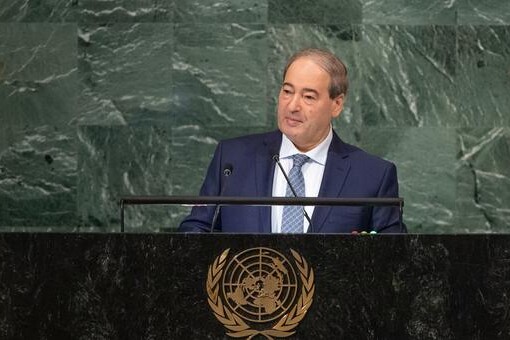“The hope embodied by the people of Iraq, had enabled them to snatch opportunities for life, progress and peace from the clutches of crisis and conflict,” the Prime Minister told leaders gathered in New York for the Assembly’s annual high-level debate.
The people of Iraq had also used that same spirit of hope to fight terrorism and ultimately defeat it on behalf of the entire world. “That task was arduous. Our people made enormous sacrifices, not only to liberate their land from the terrorist gangs of ISIL, but to also keep them from threatening people everywhere,” the Prime Minister explained.
“We succeeded in uprooting this destructive ideology,” he said, paying tribute to the “martyrs of Iraq” who had sacrificed their lives in defense of the values of justice, democracy and human rights. Iraq looked forward to receiving further UN support to reconstruct areas affected and occupied by ISIL terrorists.
Reconstruction of liberated areas
At the same time, he stressed that any potential UN aid to respond to the urgent and necessary humanitarian needs must enhance Iraq’s capability to rebuild destroyed infrastructure in a way that would help our cities and people, including Internally displaced persons (IDPs) to return to normal life.
Prime Minister Al-Kadhimi highlighted that the Iraqi Government had developed a comprehensive plan for the reconstruction of those areas that had been under ISIL control, as well as for the rehabilitation of infrastructure and the safe and voluntary return of displaced people, and he expressed profound thanks to donor countries and international organizations for their humanitarian support and assistance.
“From this podium, I reiterate Iraq’s calls for its territories to not be used under the pretext of fighting terrorism or protecting the national security of other countries in a manner that endangers our security and stability,” he stated, called strongly for strengthening cooperative ties and ensuring respect for the principle of sovereignty and territorial integrity.
Free and fair elections
Prime Minister Al-Kadhimi went on to say that Iraq was committed to protecting democratic processes and the peoples’ demands to democratically exercise their right, the Iraqi Government has endeavored to establish free and fair elections with the support of the UN, the Security Council and other international organizations that had praised their integrity.
Despite the success of those elections, the political forces could not agree on the the government’s formation, leading to a political impasse. “My Government has called for a serious and transparent dialogue among all political forces and parties to discuss ways out of the current political crisis in an effort by the Government to meet the peoples’ aspirations and hopes,” he explained.
He added that his Government was seeking to build an Iraq that ensured coexistence among all Iraqi people while respecting diversity and ideological and religious pluralism based on the principles of justice and equality. This would be accomplished by ensuring freedom of expression and human rights.
“Iraq is keen to be a source of stability, both regionally and internationally… and mend ties between the region’s countries, which have long suffered from war and crises. The time has come to rebuild the region based on the balanced policy pursued by this Government,” he said.
Rivers drying up, marshes under threat
Mr. Al-Kadhimi Iraq was facing serious challenges due to scarcity of water sources, shifts in the courses of river flows and the building of projects without taking into consideration the effects on water quotas. “Iraq is now the fifth most vulnerable country to the impacts of climate change.”
On top of this, most of the country’s marshes had dried up damaging the livelihoods of hundreds of families living there. These natural preserves were on the UNESCO World Heritage List and their deterioration had sparked internal displacement and a significant decrease in the availability of arable land.
“Iraq calls upon all the region’s countries to enter into a dialogue to resolve these water issues in line with international treaties,” he said, noting at the same time that Iraq was a oil producer and as it was affected by climate change, it would also be affected by measures taken to address the phenomenon regarding reduction in dependence of fossil fuels.
Nevertheless, his Government had worked on a host of projects dealing with clean energy, associated gas extraction and other areas related to the green economy. In all this, Iraq would need help from the international community so that it could mitigate and adapt to the adverse effects of climate change.
In conclusion, he said: “The challenges facing Iraq today are the result of decades of political crises and conflict. We are working to dismantle them, placing our hopes on our young society’s aspiration to defend democracy. Our nascent democracy still has a spirit of courage and hope. It needs the understanding and support of the international community so that we can continue building the modern State, providing service and reconstructing infrastructure destroyed by wars and rebuilding infrastructure destroyed by wars.




